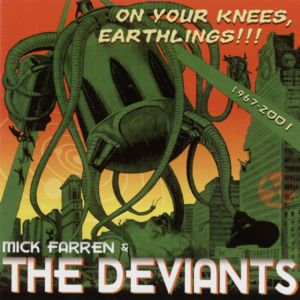
- Format: MP3

Talk today about Britain's psychedelic psyxties, and it's the light whimsy of Syd Barrett's Pink Floyd, the gentle introspection of the village green Kinks, Sgt. Pepper, and "My White Bicycle" which hog the headlines. People have forgotten there was an underbelly as well, a seething mass of discontent and rancor which would eventually produce the likes of Hawkwind, the Pink Fairies, and the Edgar Broughton Band. It was a damned sight more heartfelt, too, but the more some fete the lite-psych practitioners of the modern age (they know who they are), the further their reality will recede. Fronted by journalist/author/wild child Mick Farren, the Deviants spawned that reality. Over the years, three ex-members would become Pink Fairies; for subsequent reunions, sundry ex-Fairies would become honorary Deviants. And though only Russell Hunter is present on Ptooff!, still you can hear the groundwork being laid. The Pink Fairies might well have been the most perfect British band of the early '70s. The Deviants were their dysfunctional parents. In truth, Ptooff! sounds nowhere near as frightening today as it was the first (or even 21st) time out; too many reissues, most of them now as scarce as the original independently released disc, have dulled its effect, and besides, the group's own subsequent albums make this one look like a puppy dog. But the deranged psilocybic rewrite of "Gloria" which opens the album, "I'm Coming Home," still sets a frightening scene, a world in which Top 40 pop itself is horribly skewed, and the sound of the Deviants grinding out their misshapen R&B classics is the last sound you will hear. Move on to "Garbage," and though the Deviants' debt to both period Zappa and Fugs is unmistakable, still there's a purity to the paranoia. Ptoof! was conceived at a time when there genuinely was a generation gap, and hippies were a legitimate target for any right-wing bully boy with a policeman's hat and a truncheon. IT and Oz, the two underground magazines which did most to support the Deviants (Farren wrote for both), were both publicly busted during the band's lifespan, and that fear permeates this disc; fear, and vicious defiance. It would be two years, and two more albums, before the Deviants finally published their manifesto in all its lusty glory "we are the people who pervert your children" during their eponymous third album's "People Suite." But already, the intention was there.
The third and, for the time being, final Deviants album is also, according to frontman Mick Farren, the record that they should never have made. Writing in his 2001 autobiography, Give the Anarchist a Cigarette, Farren observes that even the album's title encapsulated the group's state of mind "so creatively tapped out we couldn't even come up with a snappy name for the damned record." He is being harsh. While The Deviants, No. 3 can in no way be compared to either of its predecessors, or to Farren's own magnificent solo album Mona, it is still a fascinating glimpse into the state of the British underground in 1969. A few of the songs are indeed as unrehearsed (and certainly undeveloped) as Farren has since complained "Death of a Dream Machine" is little more than a jingle, when it ought to be a masterpiece. But it's also a considerably more coherent album than the group's speed-freak monster mash reputation might allow you to expect, and it doesn't even sound that horribly dated. At its most seething, "Billy the Monster," the sinister Zappa-esque chant with which the album opens, captures the archetypal hippie-freak. Then, skip over the somewhat Airplane-y "Broken Biscuits" and "First Line," and you reach "The People's Suite" and what could be more brilliant than a suite that lasts just two and a half minutes? "We are the people who pervert your children, lead them astray from the lessons you taught them": Again, Zappa hangs heavy over the proceedings, but if the tabloids of the day ever needed to have their worst fears confirmed, the Deviants were pleased to oblige. Musically, The Deviants, No. 3 hangs in a void somewhere between the early Edgar Broughton Band, with whom they enjoyed the wildest rivalry, and the incipient Pink Fairies, to which all the members bar Farren soon fled. Culturally, however, it is a brutal reminder of that moment when the '60s dream teetered on the brink of the precipice, and the planet went to hell in a handcart around it.